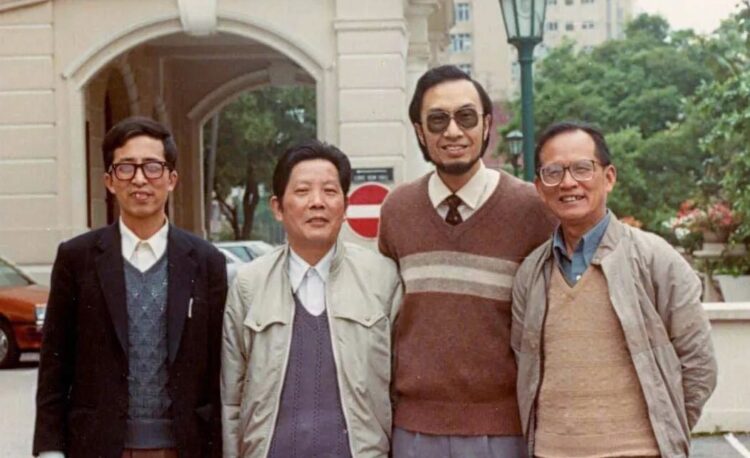I was deeply unexpected and saddened to learn that Professor Huo Qichang, an expert in the history of Hong Kong and Macau, died of illness in Macau on September 12. I can’t help but recall all the past events I had with him before. I first met him in April 1983. At that time, he was a specially invited representative of Hong Kong to attend the Third National Congress of the Chinese Historical Society in Beijing and visited the Institute of Modern History of the Chinese Academy of Social Sciences. My teacher, Director Yu Shengwu, asked me to participate in the reception work and accompany Professor Huo to visit the Palace Museum. At that time, our research institute had just started studying the history of Hong Kong. Professor Yu invited Professor Huo to participate in the cooperative research, and he readily agreed.

Professor Huo Qichang received experts from the Chinese Academy of Social Sciences at the University of Hong Kong in the spring of 1985. From the left, they are Liu Shuyong, Liu Cunkan, Huo Qichang, and Yang Shihao. (This image is provided by the author)
At that time, it was the early stage of reform and opening up, and the information channels were not smooth. Professor Huo Qichang provided us with a large amount of information on the history of Hong Kong overseas, which greatly benefited us. It was at the suggestion of Professor Huo that the Chinese Academy of Social Sciences used 30000 pounds of foreign exchange to purchase microfilm from the British Colonial Department’s CO129 series of archives, covering correspondence between the Hong Kong government and the British government from the 19th century to the 1950s. Later, Professor Huo purchased an advanced reading and printing machine for us in Hong Kong to read and photocopy microfilm. These have greatly improved the quality and efficiency of our research on the history of Hong Kong.
Professor Huo Qichang was invited to participate in the compilation of two academic works on Hong Kong in the 19th Century and Hong Kong in the 20th Century by the Hong Kong History Research Group of the Institute of Modern History. He wrote manuscripts on the topics of Hong Kong before the British occupation and Hong Kong and the 1911 Revolution, respectively. In addition, he repeatedly provided constructive suggestions on the preparation of the two books, such as how to use historical archives objectively and impartially to reach convincing conclusions.

A letter of condolence from the Institute of Modern History, Chinese Academy of Social Sciences to Professor Huo Qichang’s family.
The Hong Kong History Research Group of the Institute of Modern History first visited Hong Kong from March to May 1985 to collect data and investigate. The members included my teacher Professor Liu Cunkan, colleague Professor Yang Shihao, and me. Professor Huo Qichang made extremely thoughtful arrangements for us. He invited the Asian Studies Centre of the University of Hong Kong as the reception unit, and arranged for us to collect information at the Hong Kong University on Road Library and the Chief Secretary’s Department Library. He accompanied us to visit the Hong Kong Museum and investigate Macau. He also invited Mr. Yang Guoxiong, Director of the Kong On Road Library, to drive with us during our inspection tour of Zeng’s Tai Wai, Hou Wang Temple, Kowloon City, and other places. At that time, as the country was just beginning to reform and open up, we only had very limited travel expenses, thanks to Professor Huo’s careful arrangement for us. Through Professor Chen Kunyao, he arranged for us to live in the Ming Ai Center dormitory, which is very close to the University of Hong Kong, and the accommodation fee is cheap. I remember that at that time, the accommodation fee for a room per day was only HK $80.
In addition, Professor Huo Qichang actively promotes academic exchanges across the Taiwan Strait and internationally. As Chairman of the Preparatory Committee, he hosted the first International Symposium on the History of Chinese Customs at the University of Hong Kong in 1988. Scholars such as Chen Shiqi and Zhang Jiqian from the mainland and Zhang Cunwu and Zhao Shumin from Taiwan gathered together, and I was also invited to attend. I still remember the sparks and interesting events that arose from the first meeting of scholars from both sides of the Taiwan Strait.
Professor Huo Qichang’s writings are abundant. In addition to participating in the compilation of the New Edition of the History of Hong Kong, he has also authored Hong Kong and Modern China: A Review of Hong Kong History by Huo Qichang, Reference Materials for the Teaching of Hong Kong History, The Revolution of 1911 in the Archives of Hong Kong and Macau, Macau: Sun Yat sen’s Outward Portal, Hong Kong and the Asian Pacific (1840-1900), Lectures in Hong Kong History、Estudos Sobre a Instalaçã dos Portugueses em Macau, and others. The death of Professor Huo Qichang is a major loss for the historical circles of Hong Kong and Macau. However, the tree of learning is evergreen. Although he has gone far away, he has left a valuable academic legacy.
Liu Shuyong (Originally published in Ta Kung Pao)

